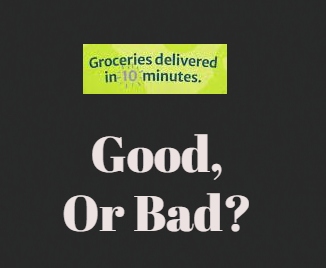

By Linus Garg
First publised on 2022-03-22 08:45:35
Even as Zomato becomes the latest to jump on the 10-minute delivery bandwagon, the debate about the ill-effects of the 10-minute grocery or food or medicine (or whatever you have) delivery goes on. So is it really an innovation that will revolutionize the system or is it an extra load on the delivery partners who will now be under huge stress?
When Grofers (now Blinkit) introduced it is August 2021 in 10 cities to start with, it received a lot of hate mail where people criticized it for making slaves out of delivery partners and not keeping their physical and mental well-being in mind. The company founder Albinder Dhindsa had then clarified that the system had been launched after detailed study that took in parameters like the density of the stores, the packing time and the distance. He said that since orders were packed instantly and given to riders within 3 minutes and they had to deliver it within a distance of maximum 2 kms, it was possible for them to do so within 10 minutes without risking their lives by driving fast or breaking traffic rules. He also added that no rider accidents were reported in the few weeks that the system was in operation.
On the face of it, the fast delivery system is indeed a boon for customers as they can get essentials instantly. It is an innovation which, backed by the right technological and logistical inputs, can revolutionize the ecommerce sector. But there can be no denying that there are other factors that need to be looked into. For instance, if a delivery partner reaches the address in 8 minutes and finds that he has to deliver the package on the 8th floor and the elevator is not working, what will he do? Climb up the stairs to meet the deadline? Similarly, what about inclement weather conditions? Further, there is no doubt that a rushed system of delivery will put the riders under mental stress and they would be expected to work in a clock-work fashion. The risk of accidents will always be there and riders will be forced to break traffic rules in some cases to keep up with the deadline. But if the companies maintain a good system, the riders earn more money, are not unduly worried about the extra work load and there is no mental stress for them, there really can be no criticism for the system. The protest, if any, should come from the riders if they feel that the instant delivery system is taking a toll on their physical or mental health without benefitting them in any way.











